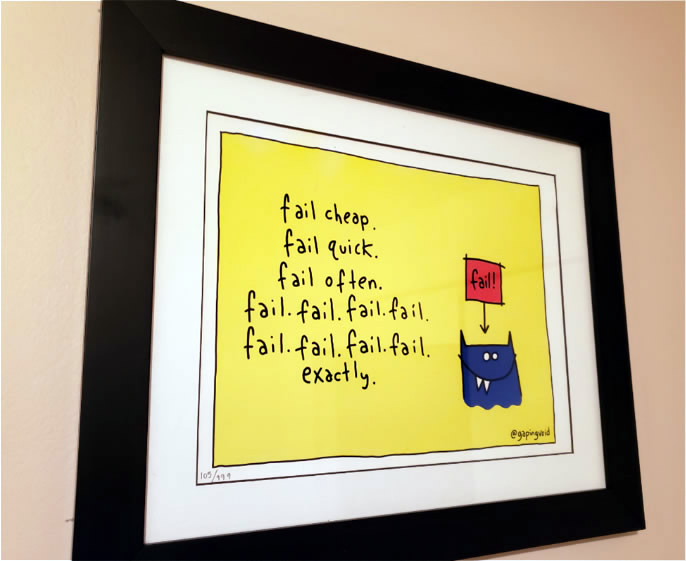
In what some readers interpreted as a piece of gentle advice to startup founders, Seth Godin recently took issue with the cocky approach to strategy embodied in the remark: “I don’t see how it could fail.”
If you haven’t studied various ways that your product could fail to connect with its target market, then you might not have deep enough insight into how difficult the journey is going to be. If success were an uncomplicated, one-way ticket to the pot of gold at the end of the rainbow, tickets would not only be astronomically expensive, they’d already be sold out.
Granted, the big success stories of persistence we often hear about (like the above-mentioned unicorns) may come out of “Silicon Valley royalty,” “bro culture,” and “winner take all-style” funding and company-building expertise the likes of which the average firm won’t want to emulate.
It’s worth pausing on that point, though. Success in growing a business through online channels isn’t risk-free, nor is it cost-free. Finding the cash to gain a quick advantage might have to eat into your lifestyle, or some debt or equity financing will have to be found. The clients we’ve worked with who have grown from very small origins have, at some point, sought to accelerate growth by taking on partners and risk.
At the end of the day, we’re all versions of Zappos’ Tony Hsieh, who had to go out and find major backing to handle Zappos’ growth and inventory needs (and even at that, went through a massive crisis when Wells Fargo wanted to shut down his line of credit). And he was a guy who started the journey with millions of dollars in the bank from his fortunate sale of LinkExchange to Microsoft!
Zappos wasn’t very good when Tony launched it as “shoesite.com.” Many of us now have the luxury of studying tales like Zappos’ to help us reduce the number of mistakes we make, even if we don’t plan to grow a business to nearly that size, nor sell it to Amazon, as Tony was able to do. I’d recommend a book to help you better study Tony, but Google away! There are several great case studies of Tony and Zappos.
Beyond the Fail
Not everyone knows this, however. They forget about how tough the competition is. They forget about how hard things are starting out in any “startup environment.” You have to absolutely love experimentation to succeed in today’s cutthroat business environment.
Think about Twitter as a business. It earned less than $1 billion in revenue in its first three years after going public about eight years ago. But if memory serves, it made absolutely no revenue in the first three years after its founding! Remember how no one really knew exactly what it was or how the heck it could ever make any money? Today the company makes over $3 billion a year in revenues. Not as great as some other Internet media names, but still, it’s safe to say it’s a business.
If you’re impatient for success, you’ll probably fail.
Mike McDerment of FreshBooks once told me not to get too discouraged by HomeStars’ slow growth in some of its first seven years. He said FreshBooks didn’t really hit its stride until its ninth or tenth year in business. More recently, FreshBooks has raised tens of millions of dollars in venture capital, and in the summer of 2019, added a large, undisclosed “strategic investment” from bank JP Morgan Chase. That’s quite the overnight success! FreshBooks was founded in 2002.
If you’ve got a more recognizable, logical line of business than Twitter had was in ’06, and you’re getting set to ramp up its advertising – or even better, a business that already has tons of customers and data – arguably you have enough of a head start that it won’t take more than a few months before the PPC-driven learnings begin to snowball into more obvious opportunity.
But get ready to be very immersed in the process.
Activate Beast Mode
Many PPC campaigns, and thus, entire companies, face a failure-to-launch scenario because:
- They haven’t found the right keywords, yet.
- Their ads don’t resonate with the select few people who will become eager buyers, yet.
- Their advocates, who also generate repeat sales, haven’t spread the word far and wide, yet.
- The keywords and ads haven’t achieved high enough Quality Scores to generate affordable CPC’s and reasonable volumes, yet.
- Some of the tactics being pursued, because marketing managers and their bosses often have their own theories or inherit them from a sea of hearsay from novice-to-immediate practitioners, are either the exact opposite of what will work, or at the very least, are one-sided when they should be contingent on circumstances.
(Cough, cough: professionals can help accelerate your learning and avoid pointless, uninformed trial and error, obviously. That’s why clients hire us at Page Zero.)
Sports analogy: in early 2020, legendary NFL running back Marshawn “Beast Mode” Lynch found himself back in the starting lineup of the Seattle Seahawks due to an injury to the starting running back. Handoff to Lynch at the Packers’ 2-yard-line. Lynch, one of the most powerful and exciting ball-carriers in the history of American football, slams into an immovable (even for the Beast) wall of humanity – three strong defenders stacking up two blockers. This pile is going nowhere. Almost daintily, Lynch sidesteps. From there, it’s a relative walk in the park as he pile-drives two off-balance defenders and powers his way across the goal line. Touchdown!
(The Seahawks went on to lose the game. You may now dismiss the above paragraph as mere entertainment.)
Lynch isn’t just powerful or quick. He also keeps at it until he finds a hole in the defense (even if for Beast Mode, a “hole” means merely two weaker defenders he can shove backward).
Companies who are properly prepared for a challenging journey might already be anticipating a host of momentary failures. Thus, they might be putting themselves into a better mindset for persisting towards eventual success. Even Beast Mode needs to sidestep once in awhile.
Failing Forward
The “PPC mindset” allows for constant learning and adaptation. If you think you know something about your market, but it will only cost you $10 or $800 to be very certain about this, wouldn’t you want to invest in that learning?
Once, we took on a mid-market client (in a banking niche) who had had past (measurable) success acquiring customers via direct mail and (not very measurable) TV advertising. They’d never tried Google advertising and needed to be convinced it would “work.” It worked. (We also convinced them to take their outdated, unreliable direct mail data with a grain of salt, and just let the real-time data guide us.) A year later, their typical monthly Google ad budget was $80,000. While we were on the job, it rose to as much as $150,000. BEAST MODE ENABLED!
A fixed mindset might have concluded that this channel simply wasn’t any good. Without the right mindset, that banking-industry firm would have virtually no online customer acquisition, and would be shrinking today. Hats off to Dean here at Page Zero for making that one work!
This process of discovery is at the heart of some pretty heavy strategic thinking from none other than Jim Collins. In Great By Choice, a sequel to his monster bestseller Good to Great, Collins outlines an approach to breaking into new markets: bullet, bullet, bullet, calibrated cannonball. In other words, make sure your approach is on target – and then and only then, go all-in with it.

Figure 1: Framed print by Hugh MacLeod, inspiring me in my home office. You can buy something similar at gapingvoidart.com.
In a not-unrelated insight, Collins generally eschews fantasies of hypergrowth in favor of solid growth that, if you will, keeps its wits about it.
“Bullet, bullet, bullet” – admittedly, a tad warlike – is a wonderful example of what all the tiny segments of a new Google Ads campaign represent. On a surprisingly limited budget, you can learn an awful lot, and carry forward to do better next month.
And even if you’re letting Google ding the card “only” $750 at a time, it can add up to a lot of wasted time and money going nowhere slowly. The paradox is, those who most often wallow in this waste think they’re doing it “right.”
Those who stand a chance of winning big are more like Taleb. And another delicious quote from Fooled by Randomness:
It was not until modern times that … desire to be free from our own past statements emerged. Nowhere was it made more eloquently than in rioting student graffiti in Paris. The student movement that took place in France in 1968, with the youth no doubt choking under the weight of years of having to sound intelligent and coherent, produced, among other jewels, the following demand:
We demand the right to contradict ourselves!
Building on that mindset, next week, I’ll cover three things that you ABSOLUTELY MUST DO in PPC accounts. Or not do.
Read Part 14: The Two Things You Must Absolutely Do (or Not Do) to Achieve PPC Success